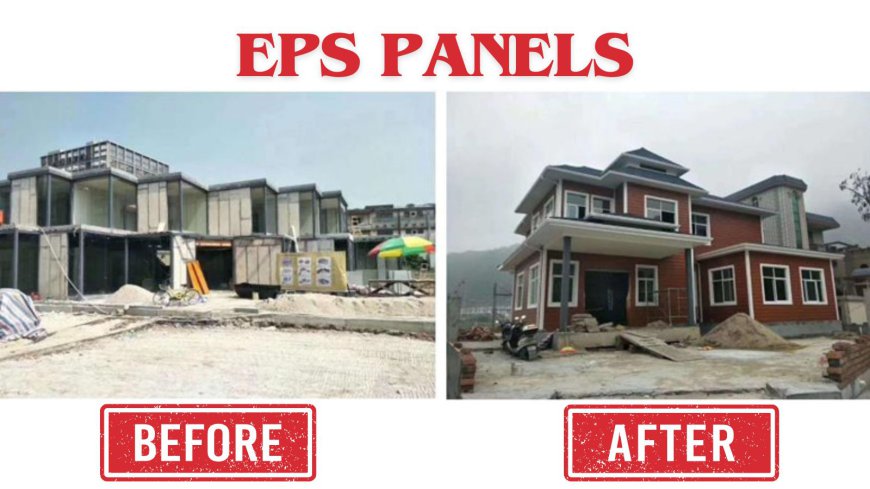The Advantages of EPS Panels in Modern Architecture
Discover the benefits of EPS panels in India for durable, energy-efficient construction, revolutionizing building solutions today!

In recent years, the construction industry has undergone a significant transformation, with innovative materials and techniques reshaping how we approach building projects. One of the most promising advancements in this field is the use of Expanded Polystyrene (EPS) panels. Known for their lightweight nature, thermal insulation properties, and versatility, EPS panels have emerged as a game-changer in modern construction. This blog explores the advantages of EPS panels, their applications in India, and how they compare to traditional cement wall panels.
Understanding EPS Panels
EPS panels are composite building materials made of expanded polystyrene foam sandwiched between two layers of structural board, typically made of steel, cement, or other durable materials. The unique composition of EPS panels provides exceptional insulation, soundproofing, and strength, making them an ideal choice for various construction applications.
The Rise of EPS Panels in India
As the demand for sustainable and efficient building materials grows, EPS panels have gained traction in India. The country's booming construction sector has led to a search for materials that not only meet environmental standards but also offer cost-effectiveness. EPS panels have emerged as a viable solution, combining affordability with superior performance.
Benefits of EPS Panels
1. Lightweight and Easy to Handle
One of the most significant advantages of EPS panels is their lightweight nature. Traditional construction materials like cement wall panels can be cumbersome and challenging to handle. In contrast, EPS panels are easy to transport, manipulate, and install, significantly reducing labor costs and time on construction sites.
2. Excellent Insulation Properties
EPS panels offer outstanding thermal insulation, helping to maintain comfortable indoor temperatures while reducing energy consumption. This property is particularly valuable in India, where temperatures can vary drastically between seasons. By utilizing EPS panels, builders can create energy-efficient structures that require less heating and cooling, ultimately lowering utility bills for occupants.
3. Cost-Effective Solution
In a market where construction costs are continually rising, EPS panels present a cost-effective alternative. The reduced weight translates to lower transportation costs, while faster installation times lead to decreased labor expenses. Additionally, the energy savings achieved through improved insulation can offset the initial investment in EPS panels over time.
4. Durability and Strength
Contrary to common misconceptions about lightweight materials, EPS panels are surprisingly strong and durable. They are resistant to moisture, mold, and pests, making them suitable for various climates and conditions. This durability enhances the lifespan of structures, resulting in long-term savings for property owners.
5. Versatile Applications
EPS panels are incredibly versatile and can be used in a wide range of applications, including residential buildings, commercial structures, and industrial facilities. They are ideal for walls, roofs, and even floors, offering architects and builders the flexibility to design innovative spaces.
6. Eco-Friendly Choice
In an era where sustainability is a top priority, EPS panels stand out as an eco-friendly building material. They are recyclable and can be produced with minimal environmental impact. The reduced energy consumption of buildings constructed with EPS panels further contributes to a smaller carbon footprint.
EPS Panels vs. Cement Wall Panels
While EPS panels offer numerous advantages, it’s essential to compare them with traditional cement wall panels to understand their unique benefits better.
Weight and Handling
Cement wall panels are significantly heavier than EPS panels, making them more challenging to handle during installation. The lightweight nature of EPS panels allows for easier transportation and quicker assembly, which is crucial in fast-paced construction environments.
Insulation Properties
Cement wall panels offer some insulation; however, they cannot match the thermal performance of EPS panels. The superior insulation properties of EPS panels help reduce energy costs, making them a more energy-efficient option for modern buildings.
Cost
Cement wall panels can be more expensive due to their weight and the associated handling and transportation costs. On the other hand, EPS panels offer a more budget-friendly alternative, particularly for large-scale projects.
Environmental Impact
Cement production is energy-intensive and contributes significantly to greenhouse gas emissions. In contrast, EPS panels are produced with a lower environmental impact and can be recycled, aligning with sustainable building practices.
Applications of EPS Panels in India
EPS panels have found their place in various sectors within India, from residential housing to commercial buildings. Here are some common applications:
Residential Buildings
With the rapid urbanization in India, the demand for affordable housing solutions has increased. EPS panels provide an excellent option for builders looking to create cost-effective and energy-efficient homes. Their lightweight nature simplifies construction, enabling quicker project completion.
Commercial Spaces
In the commercial sector, EPS panels are used for office buildings, shopping malls, and hotels. Their aesthetic versatility allows for modern architectural designs while ensuring energy efficiency.
Industrial Structures
EPS panels are also utilized in industrial facilities, where durability and insulation are paramount. These panels can withstand harsh environments and contribute to reducing energy consumption in warehouses and manufacturing plants.
Conclusion
As the construction industry in India continues to evolve, the adoption of innovative materials like EPS panels India is essential for meeting modern demands. Their lightweight nature, excellent insulation properties, cost-effectiveness, and versatility make them a superior choice over traditional cement wall panels. By embracing EPS panels, builders can create energy-efficient, sustainable structures that cater to the needs of today's market while paving the way for a greener future in construction.
In conclusion, EPS panels are not just a trend but a significant advancement in construction technology. As we look toward the future, it is clear that incorporating EPS panels into building projects will lead to more efficient, cost-effective, and environmentally friendly construction practices across India.
